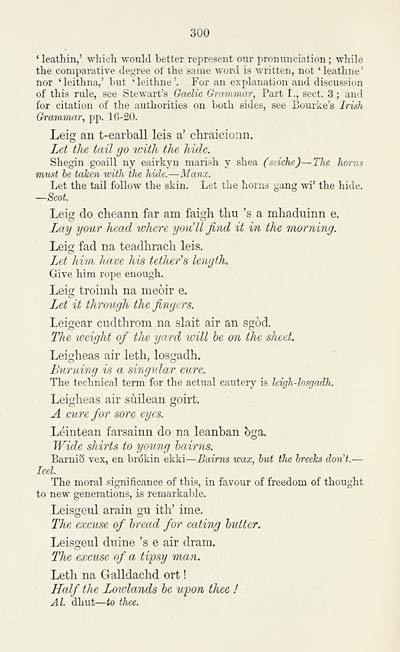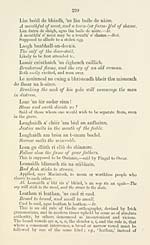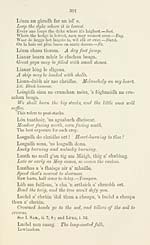Download files
Complete book:
Individual page:
Thumbnail gallery: Grid view | List view

300
'leathin,' which would better represent our pronunciation; while
the comparative degree of the same word is v/ritten, not 'leathne'
nor ' leithna,' but ' leithne '. For an explanation and discussion
of this rule, see Stewart's Gaelic Grammar, Part I., sect. 3 ; and
for citation of the authorities on both sides, see Bourke's Irish
Grammar, pp. 16-20.
Leig an t-earball leis a' chraicionn.
Let the tail go loith the hide.
Shegin goaill ny eairkyn marish y shea (seiche) — The horns
must be taken with the hide. — Manx.
Let the tail follow the skin. Let the horns gang wi' the hide.
—Scot.
Leig do cheann far am faigh thu 's a mhaduinn e.
Lay your head where yon II find it in the morning.
Leig fad na teadhracli leis.
Let him have his tether's length.
Give him rope enough.
Leig troimh na meòir e.
Let it through the fingers.
Leigear cudthrom na slait air an sgòd.
The weight of the yard will he on the sheet.
Leigheas air leth, losgadh.
Burning is a sbigvlar cure.
The technical term for the actual cautery is leigh-losgadh.
Leigheas air siiilean goirt.
A cure for sore eyes.
Lèintean farsainn do na leanban òga.
Wide shirts to young bairns.
BarniS vex, en brokin ekki — Bairns wax, but the breeks don't. —
Icel.
The moral significance of this, in favour of freedom of thought
to new generations, is remarkable.
Leisgeul arain gu ith' ime.
The excuse of bread for eating butter.
Leisgeul duine 's e air dram.
The excuse of a tipsy man.
Leth na Galldachd ort !
Half the Lowlands be upon thee !
Al. dhut — to thee.
'leathin,' which would better represent our pronunciation; while
the comparative degree of the same word is v/ritten, not 'leathne'
nor ' leithna,' but ' leithne '. For an explanation and discussion
of this rule, see Stewart's Gaelic Grammar, Part I., sect. 3 ; and
for citation of the authorities on both sides, see Bourke's Irish
Grammar, pp. 16-20.
Leig an t-earball leis a' chraicionn.
Let the tail go loith the hide.
Shegin goaill ny eairkyn marish y shea (seiche) — The horns
must be taken with the hide. — Manx.
Let the tail follow the skin. Let the horns gang wi' the hide.
—Scot.
Leig do cheann far am faigh thu 's a mhaduinn e.
Lay your head where yon II find it in the morning.
Leig fad na teadhracli leis.
Let him have his tether's length.
Give him rope enough.
Leig troimh na meòir e.
Let it through the fingers.
Leigear cudthrom na slait air an sgòd.
The weight of the yard will he on the sheet.
Leigheas air leth, losgadh.
Burning is a sbigvlar cure.
The technical term for the actual cautery is leigh-losgadh.
Leigheas air siiilean goirt.
A cure for sore eyes.
Lèintean farsainn do na leanban òga.
Wide shirts to young bairns.
BarniS vex, en brokin ekki — Bairns wax, but the breeks don't. —
Icel.
The moral significance of this, in favour of freedom of thought
to new generations, is remarkable.
Leisgeul arain gu ith' ime.
The excuse of bread for eating butter.
Leisgeul duine 's e air dram.
The excuse of a tipsy man.
Leth na Galldachd ort !
Half the Lowlands be upon thee !
Al. dhut — to thee.
Set display mode to: Large image | Transcription
Images and transcriptions on this page, including medium image downloads, may be used under the Creative Commons Attribution 4.0 International Licence unless otherwise stated. ![]()
| Early Gaelic Book Collections > Blair Collection > Collection of Gaelic proverbs and familiar phrases > (340) |
|---|
| Permanent URL | https://digital.nls.uk/76281030 |
|---|
| Description | A selection of books from a collection of more than 500 titles, mostly on religious and literary topics. Also includes some material dealing with other Celtic languages and societies. Collection created towards the end of the 19th century by Lady Evelyn Stewart Murray. |
|---|
| Description | Selected items from five 'Special and Named Printed Collections'. Includes books in Gaelic and other Celtic languages, works about the Gaels, their languages, literature, culture and history. |
|---|

